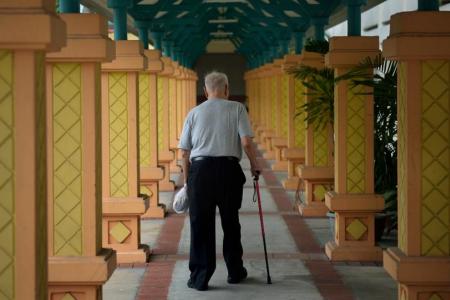Poverty not sole cause of rise in elderly on ComCare
More tap on social welfare, experts say accessibility and filial factors at work
At first glance, the salient trend highlighted in last week's Community Care (ComCare) annual trends report seems glaring.
The number of retirees on short-to-medium-term help went up from 9.9 per cent in 2012 to 12.9 per cent last year.
Those aged 55 and above who applied for such help also increased during the same period - from 29.4 per cent to 35.2 per cent.
ComCare is a key social safety net for low-income Singaporeans and provides three broad types of assistance:
- long-term help, largely for the elderly poor
- interim as well as short- to medium-term help for those facing a crisis, such as illness or retrenchment, and
- student care subsidies for children.
These figures, when viewed together with the familiar image of frail seniors toiling away at food centres or collecting cardboard, beg the question of our seniors' welfare: Are they in such dire financial straits that they have to work in their silver years just to get by?
With no official definition of the poverty line here, the number of seniors who are receiving ComCare aid could be seen as a proxy measure of the extent of poverty.
In addition, Manpower Ministry figures show that more people are working beyond their retirement age of 62 - more than 40 per cent of people aged 65 to 69 were still working last year, compared with just 24 per cent in 2006.
But former Nominated Member of Parliament Eugene Tan thinks that, rather than being a deteriorating social situation in Singapore, the ComCare trend is due to a combination of factors ranging from retirement inadequacy to less onerous ComCare eligibility criteria.
The Singapore Management University law don said: "There's no need to press the panic button yet, but the numbers need close watching, particularly those who move on to long-term assistance.
"It's like a canary in a mine - it could be a false alarm, but it's something we should not take our eyes off.
"In the end, ComCare only deals with the symptoms. If the situation worsens, it may take more systemic action, like job placements and a CPF revamp, to deal with the root causes."
As for the trend of more people 55 and above receiving handouts, the associate professor said their savings may be inadequate for the cost of living today. If they face a temporary crisis, it's worse.
"The same can be said for their CPF (Central Provident Fund) savings as well, because the wages were lower. And so they do not have the nest egg that can see them through the retirement years," he said.
More people became eligible for ComCare - supported by the Community Care Endowment Fund - after the criteria were tweaked to benefit more families who require short- to medium-term assistance.
Among other things, the household income cap was raised from $1,500 to $1,900, and the per capita income criterion was reviewed so that families with more dependants could qualify.
Said Associate Prof Tan: "Comcare is meant to be short-term, temporary assistance, so its requirements are not onerous, resulting in more people being eligible. The Government's active promotion of ComCare also made more people willing to seek short-term assistance.
"It could also be a situation of someone drawing the attention of the grassroots leaders to neighbours who might need help. They then assess the situation.
"Overall, ComCare is conceived and designed to be more accessible."
Sociologist Tan Ern Ser said the trend could also signify "the weakening of filial piety or the unreliability of filial obligation as a basis of inter-generational support" - something he inferred from a 2011 study of his.
FILIAL OBLIGATIONS
In the study, Dr Tan found that less than 50 per cent of the respondents said that filial obligations or repayment to parents for raising them was their main reason for supporting their parents.
In contrast, more than 50 per cent said it was the love of parents that was their main reason for doing so.
"I went on to infer that those who gave non-love reasons are more likely to resent or even avoid their obligations, even when they could afford it, while those who gave love as a reason are more likely to try to support the best they can, even when they could ill-afford it.
"I would argue that filial piety is superseded by love...," Dr Tan said.
With the uncertainties facing the global economy, it's hard to tell whether the numbers will continue to rise, said Dr Mathew Mathews, an Institute of Policy Studies senior research fellow.
"I expect that the older person in the future will probably have quite a savings retirement plan, and be more prepared financially," he said.
Get The New Paper on your phone with the free TNP app. Download from the Apple App Store or Google Play Store now



